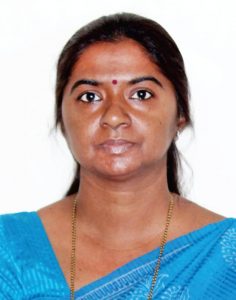
Careworks Foundation (CWF) is an NGO initiative of Quess Corp Limited (India’s leading integrated business services provider) founded in 2014 by Ajit Isaac, CMD, Quess Corp Limited. Driven by a vision to actively contribute to the community, Careworks Foundation works at creating a positive impact in the lives of people, especially in the areas of health and education. In doing so, CWF aims to build a healthy and educated workforce and provide sustainable livelihood for the weaker sections of society.
In present day India, a person aged seven years and above, who can read and write with understanding in any language, is deemed as literate. The Adult Literacy Rate (14-24 years) has shown an upward trend for females as well as males having increased from 61 to 69.3 percent during the period 2001-2011.
The Government of India has undertaken many initiatives to make education accessible for all children. It however faces challenges to mobilise and distribute investments in education efficiently to its school system. With this in mind, we are working towards supplementing the Government’s efforts.
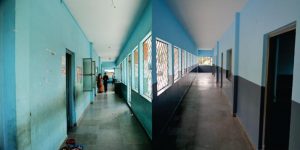 Through our flagship programme ‘School Enhancement Programme’, we are doing our bit in these existing set-ups to bring about a holistic change so that children thrive in a positive environment and reach their creative best. We believe that our interventions can be much more impactful when we work in collaboration with the existing set-up. We therefore work at enhancing the overall environment in existing government schools so that children develop an interest to come, learn, experiment, grow and evolve here. Education is the single most important factor to ensure gender equality and empowerment.
Through our flagship programme ‘School Enhancement Programme’, we are doing our bit in these existing set-ups to bring about a holistic change so that children thrive in a positive environment and reach their creative best. We believe that our interventions can be much more impactful when we work in collaboration with the existing set-up. We therefore work at enhancing the overall environment in existing government schools so that children develop an interest to come, learn, experiment, grow and evolve here. Education is the single most important factor to ensure gender equality and empowerment.
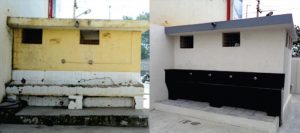 We are currently working with 30 schools, 6000 children and 300 teachers, both in urban and rural areas. Our objective is to give access to quality education to the underprivileged classes thereby empowering them to lead their life with dignity.
We are currently working with 30 schools, 6000 children and 300 teachers, both in urban and rural areas. Our objective is to give access to quality education to the underprivileged classes thereby empowering them to lead their life with dignity.
Health and education are the primary focus areas for our scope of work. There are several players in the CSR space today; we differ from the rest due to our holistic approach. We strive to strengthen the existing government initiative with our school enhancement programme. The key objective is to create a physical school infrastructure in a manner that enhances the attractiveness of the school to the child, encourages them to attend regularly and also enhances their learning levels; hence we strive to build schools that are safe, comfortable, attractive, child-friendly and accessible to all children.
The school enhancement programme is our umbrella project under which every minute element regarding making school a better place is looked at and worked upon. The programme consists of School Environment, Classroom Environment, Health and Hygiene, Teacher Learning Programme and Academic Support Programme.
“Education is the single most important factor to ensure gender equality and empowerment. CWF’s objective is to give access to quality education to the underprivileged classes thereby empowering them to lead their life with dignity”
An average student in Class II spends almost 800 hours a year in class. This is reason enough to ensure that a classroom be an attractive place that retains the interest of a child. A positive classroom not only creates a vibrant environment but also encourages creativity.
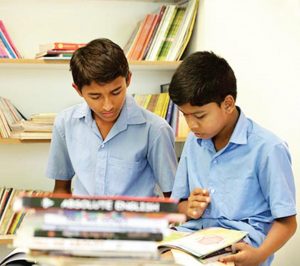 A bright, colourful school premise is created by painting the school and classrooms. Safety grills, plumbing and proper electrification makes the place accident-free, allowing a child to feel free to explore. Suitable sanitation units are provided and handwash areas are created so that sanitation is maintained at the school and children do not have to go out of the school premises to find places to relieve themselves. The programme ensures learning is suitably supplemented by setting up a well-equipped library and computer room with the required infrastructure.
A bright, colourful school premise is created by painting the school and classrooms. Safety grills, plumbing and proper electrification makes the place accident-free, allowing a child to feel free to explore. Suitable sanitation units are provided and handwash areas are created so that sanitation is maintained at the school and children do not have to go out of the school premises to find places to relieve themselves. The programme ensures learning is suitably supplemented by setting up a well-equipped library and computer room with the required infrastructure.
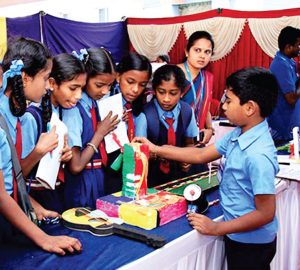 CWF works in Government schools to create a classroom environment that allows children to flourish. It encourages children to use their imagination and bring out the best within them. We work at providing some of the most basic infrastructure like benches, desks, tables, cupboards and blackboards, which are the bare essentials of a classroom. This is further supplemented by learning and sports materials to keep young minds engaged. We support the Government’s Nali Kali initiative which is based on the concept of integrating playing with learning. Illustrative concepts of learning are used in the classrooms which help children think independently and encourage interactive learning. Techniques like these simplify concepts of science and maths and make them interesting subjects to learn.
CWF works in Government schools to create a classroom environment that allows children to flourish. It encourages children to use their imagination and bring out the best within them. We work at providing some of the most basic infrastructure like benches, desks, tables, cupboards and blackboards, which are the bare essentials of a classroom. This is further supplemented by learning and sports materials to keep young minds engaged. We support the Government’s Nali Kali initiative which is based on the concept of integrating playing with learning. Illustrative concepts of learning are used in the classrooms which help children think independently and encourage interactive learning. Techniques like these simplify concepts of science and maths and make them interesting subjects to learn.
“The Health and Hygiene Programme at CWF works at safeguarding the health of the children. Through its programme, it ensures children imbibe right habits of WASH (Water, Sanitation and Hygiene)”
A clean school supports a positive learning experience; it teaches respect for property and encourages good hygiene practices. Access to safe drinking water and good sanitation promotes good health, and therefore, a better learning ability.
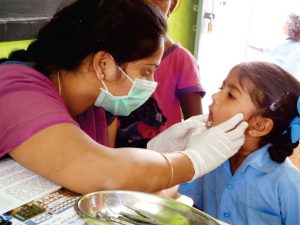 The Health and Hygiene Programme at CWF works at safeguarding the health of the children. Through its programme, it ensures children imbibe right habits of WASH (Water, Sanitation and Hygiene). Children are given access to safe and pure drinking water through water purifiers. Their health is regularly monitored through health camps and any gaps found in a child’s health is attended to and thoroughly dealt with necessary follow up.
The Health and Hygiene Programme at CWF works at safeguarding the health of the children. Through its programme, it ensures children imbibe right habits of WASH (Water, Sanitation and Hygiene). Children are given access to safe and pure drinking water through water purifiers. Their health is regularly monitored through health camps and any gaps found in a child’s health is attended to and thoroughly dealt with necessary follow up.
A teacher plays a pivotal role in the life of a child. A teacher, when empowered with the right skills, can be a role model who inspires and encourages budding minds to see the best in themselves. A teacher can convert a classroom into an energetic and creative learning space.
Our Teacher’s Learning Programme encourages teachers to be strong influencers who can mould young minds. The programme provides training to teachers on decision making and leadership. New trends in interactive teaching methods and concepts of using technology in teaching are introduced to equip them technologically. Classes on Computer Education, English Speaking and Innovative Teaching Skills to teach concepts of Maths and Science further boost the teachers’ abilities to teach confidently in class. Most importantly, teachers are trained on how to impart life skills to their students.
Teaching is not just about curriculum and studying what is in the books. A classroom environment has to go much beyond that. Teachers need to understand the unique strengths of each student and allow the student to bloom, based on his or her interest. Our academic support programme recognises this and further provides academic support that brings out the best in each child.
We provide scholarships to academically-inclined students till they complete their higher education. These scholarships are not just given at intervening schools but also to eligible children in and around the area that we work.
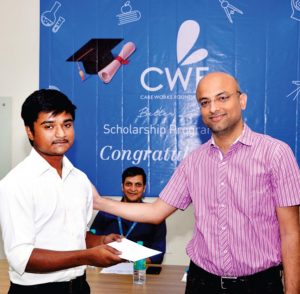 Arts, craft and theatre sessions are organised to help children realise their potentials and interests. Events and fairs are held to showcase the skills displayed by these young talents. Lifeskills sessions are conducted to prepare children to face non-academic related challenges and make them workforce ready. Children are taken outdoors for camps. Here, through trained facilitators, children are taught the importance of leadership qualities, working in teams, conflict management and problem solving. These camps have been a big success and are a great way of inculcating lifeskills amongst children.
Arts, craft and theatre sessions are organised to help children realise their potentials and interests. Events and fairs are held to showcase the skills displayed by these young talents. Lifeskills sessions are conducted to prepare children to face non-academic related challenges and make them workforce ready. Children are taken outdoors for camps. Here, through trained facilitators, children are taught the importance of leadership qualities, working in teams, conflict management and problem solving. These camps have been a big success and are a great way of inculcating lifeskills amongst children.
At the conception stage of selecting the schools, the process begins with mapping each school to spot the challenges faced by each school. An assessment of the most critical issues are made and then addressed with the involvement of Principals, school teachers, students and parents. The group then get together to identify the most suitable solutions and work on it till it is resolved. We provide facilitation, resources, funds and connects the right people and corporates so that an effective solution is arrived at.
Careworks Foundation believe in bringing together various stakeholders so that the impact is strong.
“Numerically, our work might not be as impressive as other organisations, but we focus and lay more stress on the improvement in quality of life of the children as well as the school environment. This, we believe, is something that goes far beyond numerical impact”
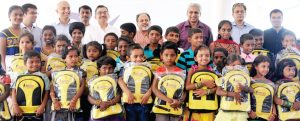 According to a Gallup’s report which studied how likely individuals would donate their time and assistance to others, India’s Civic Engagement Index Score is an abysmal 28 as compared to the United States’ 60, Australia’s 59, and even Sri Lanka’s 51. At Quess, we encourage our employees to actively participate in several CSR initiatives with opportunities like volunteering for eye-camps, teaching opportunities at the schools we support, to name a few. We also encourage our employees to support our initiatives in whatever way is possible. This not only help strengthen our own efforts but also give our employees a sense of having contributed to the society’s well-being. We engage with employees through platforms like the Joy of Giving, annual days and other such events, encouraging them to volunteer their time, money or efforts to support our programmes.
According to a Gallup’s report which studied how likely individuals would donate their time and assistance to others, India’s Civic Engagement Index Score is an abysmal 28 as compared to the United States’ 60, Australia’s 59, and even Sri Lanka’s 51. At Quess, we encourage our employees to actively participate in several CSR initiatives with opportunities like volunteering for eye-camps, teaching opportunities at the schools we support, to name a few. We also encourage our employees to support our initiatives in whatever way is possible. This not only help strengthen our own efforts but also give our employees a sense of having contributed to the society’s well-being. We engage with employees through platforms like the Joy of Giving, annual days and other such events, encouraging them to volunteer their time, money or efforts to support our programmes.
Over the years of having worked with schools, we have steadily been reaching out to more and more children, bringing long-lasting change in their lives. Numerically, our work might not be as impressive as other organisations, but we focus and lay more stress on the improvement in quality of life of the children as well as the school environment. This, we believe, is something that goes far beyond numerical impact.
Smitha BS is Head – CSR of Careworks Foundation. A seasoned corporate social responsibility professional with 16 years of experience, she is responsible for the overall functioning of the Foundation. She holds a Master’s Degree in MSW from Mangalore University and is a qualified Research Fellow from the Sathi-Ratan Tata Trust.

